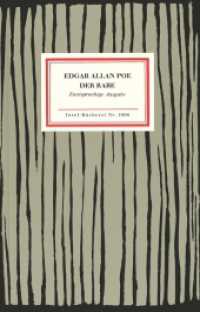Full Description
"Argumentative and Aggressive Communication is an excellent balance between research and application. This fits with the tradition of having high concern for application in the field of communication, and leaning on strong research to guide that application."
—James C. McCroskey, West Virginia University
"The thoroughness of coverage that this book devotes to perhaps the most important research area in communication today provides students with amazing insight into conflict, argumentativeness, aggressiveness, and a variety of other concepts and skills central to communication!" —Joseph A. DeVito, Hunter College of the City University of New York
Argumentative and Aggressive Communication: Theory, Research, and Application is the first text to describe the development, history, research, and application efforts on the communication traits of argumentativeness and verbal aggressiveness. Authors Andrew S. Rancer and Theodore A. Avtgis include a collection of nine widely used reliable and valid instruments which the reader, the researcher, and the practitioner can use for diagnostic and research purposes.
Key Features:
Discusses the origin and structure of argumentative and aggressive communication: The book completely describes the development of the argumentativeness and verbal aggressiveness trait constructs. In addition, the measurement of argumentativeness and verbal aggressiveness is treated in the most comprehensive way to date.
Explores the function of argumentative and aggressive communication in various contexts: Guidelines are provided on how to approach conflict and disagreement across multiple contexts in a constructive fashion. This text synthesizes the large corpus of research in several areas of communication, including family, organizational, intercultural, instructional, and mediated contexts.
Provides conclusions drawn from this literature: Suggestions are given for future research on argumentative and aggressive communication from ten distinguished communication scholars.
Intended Audience:
Written in a style accessible to undergraduates, yet comprehensive and detailed enough for graduate students and researchers, this is an ideal text for courses in Communication and Personality; Communication and Conflict; Interpersonal Communication; Social Psychology-Personality; and Psychology-Aggression.
Contents
Part I: The Structure and Origin of Argumentative and Aggressive Communication
1. What are Argumentative and Aggressive Communication?
The Genesis of the Theory of Argumentative and Aggressive Communication
Purpose of This Book
The Importance of Communication Traits
What are Communication Traits?
What is Aggressive Communication?
Constructive Aggressive Communication Traits
Categories of Trait Argumentativeness
Destructive Aggressive Communication Traits
Causes of Verbal Aggressiveness
Argumentative and Aggressive Communication Traits and Personality Theory
The Dimensions of Personality
The Relationship Between Temperament and Aggressive Communication Traits
Conclusion
Discussion Questions for Chapter 1
2. Measuring Individual Differences in Argumentative and Agressive Communication
Measuring the Argumentative and Verbal Aggressiveness Traits
The Development of the Argumentative Scale
The Development of the Verbal Aggressivness Scale
Challenges to the Scales
Critiques of the Argumentativeness Scale
Critiques of the Verbal Aggressiveness Scale
Alternative Methods of Assessing Argumentative and Aggressive Communication
Assessing Beliefs About Argumentative and Aggressive Communication
Conclusion
Discussion Questions for Chapter 2
3. Trait, State, and Interactionist Approaches to Studying Argumentative and Aggressive Communication
The Trait Perspective on Argumentative and Aggressive Communication
The Situationist Perspective on Argumentative and Aggressive Communication
Situational Factors: Topic and Topic Salience
Situational Factors: The Adversary's Attributes
Argument Topic
Context and Characteristics as Situational Influences
The Interactionist Approach to Argumentative and Aggressive Communication
Conclusion
Discussion Questions for Chapter 3
Part II: The Function of Argumentative and Aggressive Communication
4. Argumentative and Aggressive Communication in Relational and Family Contexts
Argumentativeness and Verbal Aggressiveness in General Interpersonal Relationships
Friendship Relationships
Dating Relationships
Family Relationships
Marital Relationships
Argumentativeness, Verbal Aggressiveness, and Interspousal Violence
Sibling Pairs
Parent-Child Dyads
Conclusion
Discussion Questions for Chapter 4
5. Argumentative and Aggressive Communication in Organizational Contexts
Organizational Satisfaction
Argumentativeness, Verbal Aggressiveness and Satisfaction
Argumentativeness, Verbal Aggressiveness and Gender Differences in the Organization
Argumentativeness, Verbal Aggressiveness and Other Organizational Constructs
Conclusion
Discussion Questions for Chapter 5
6. Argumentative and Verbally Aggressive Communication in Instructional Contexts
The Influence of Instructor Trait Argumentativeness
The Influence of Instructor Trait Verbal Aggressiveness
The Influence of Instructor Use of Verbally Aggressive Messages
Characteristics of the Argumentative Student
Conclusion
Discussion Questions for Chapter 6
7. Argumentative and Aggressive Communication in Intercultural and Intracultural Contexts
Co-Cultural Differences in Argumentative and Verbal Aggressiveness
Regional Differences in Argumentativeness and Verbal Aggressiveness
West Meets West
East Meets West
Conclusion
Discussion Questions for Chapter 7
8. Argumentative and Aggressive Communication in Mass and Mediated Communication
Social Learning, the Media and Aggression
Television Situation Comedies
Comparing Sitcoms to Other Television Genres
Televised Wrestling
Music
Other Mediated Communication Research
Conclusion
Discussion Questions for Chapter 8
9. Argumentative and Aggressive Communication in Persuasion and Social Influence Situations
An Orientation to Persuasion
An Orientation to Compliance-Gaining
Persuasion and Compliance-Gaining Research: A focus on Traits
A Transactional Approach to Argumentativeness and Persuasion
Processing Persuasive Messages: The Influence of Argumentative and Aggressive Communication
Argumentativeness, Verbal Aggressiveness and Compliance-Gaining Behavior
Determining Intentions to Argue: Testing Two Frameworks
Argumentative and Aggressive Communication and Resistance to Persuasion
Conclusion
Discussion Questions for Chapter 9
Part III: Enhancing Communicative Outcomes Through Improved Understanding of Argumentative and Aggressive Communication Processes
10. Modifying Argumentative and Aggressive Communication
The Call for Training
The Inventional System
Training Adults to Argue Constructively
Training in Argument
Training Adolescents to Argue Constructively
Conclusion
Discussion Questions for Chapter 10
11. Relating Argumentative and Aggressive Communication with Apprehension, Adaptation and Personality Traits
The Relationship of Argumentativeness, Verbal Aggressiveness and Apprehension Traits
The Relationship of Argumentativeness, Verbal Aggressiveness and Personality Traits
Conclusion
Discussion Questions for Chapter 11
12. Advancing Research and Theory-Building Efforts on Argumentative and Aggressive Communication
A Problem-Centered Approach to Communication Inquiry
The Research Contributions
A Focus on the Message/Individual
Cultural Influence Focus
Theoretical Foundation/Meta-Theory Focus
Measurement/Theoretical Refinement Focus
Conclusion
Discussion Questions for Chapter 12
Appendix A - The Argumentativeness and Verbal Aggressiveness Scales
Appendix B - The Adolescent Argumentativeness and Verbal Aggressiveness Scales
Appendix C - Short-Form Versions of the Argumentativeness and Verbal Aggressiveness Scales
Appendix D - The Affective-Behavioral-Cognitive Scale (ABCAS)
Appendix E - The Indirect Interpersonal Aggressiveness Scale
Appendix F - The Beliefs About Arguing Measure
Appendix G - Additional Resources on Argumentative and Aggressive Communication
References
Index








